Essay on Management Theories and Leadership in Organizations
VerifiedAdded on 2022/09/06
|8
|2073
|18
Essay
AI Summary
This essay delves into various management theories and leadership approaches, examining their strengths and weaknesses in the context of organizational goals and employee motivation. It explores the administrative management theory, quality management approaches, and Maslow's need hierarchy theory, highlighting their impact on employee engagement and performance. The essay further analyzes different leadership styles, including transformational and transactional leadership, and the importance of adapting a contingency approach to effectively manage diverse situations. It emphasizes the need for effective change management and the role of leadership in fostering employee engagement and ensuring organizational effectiveness. The essay references several scholarly articles and books to support its arguments, providing a comprehensive overview of management and leadership principles.
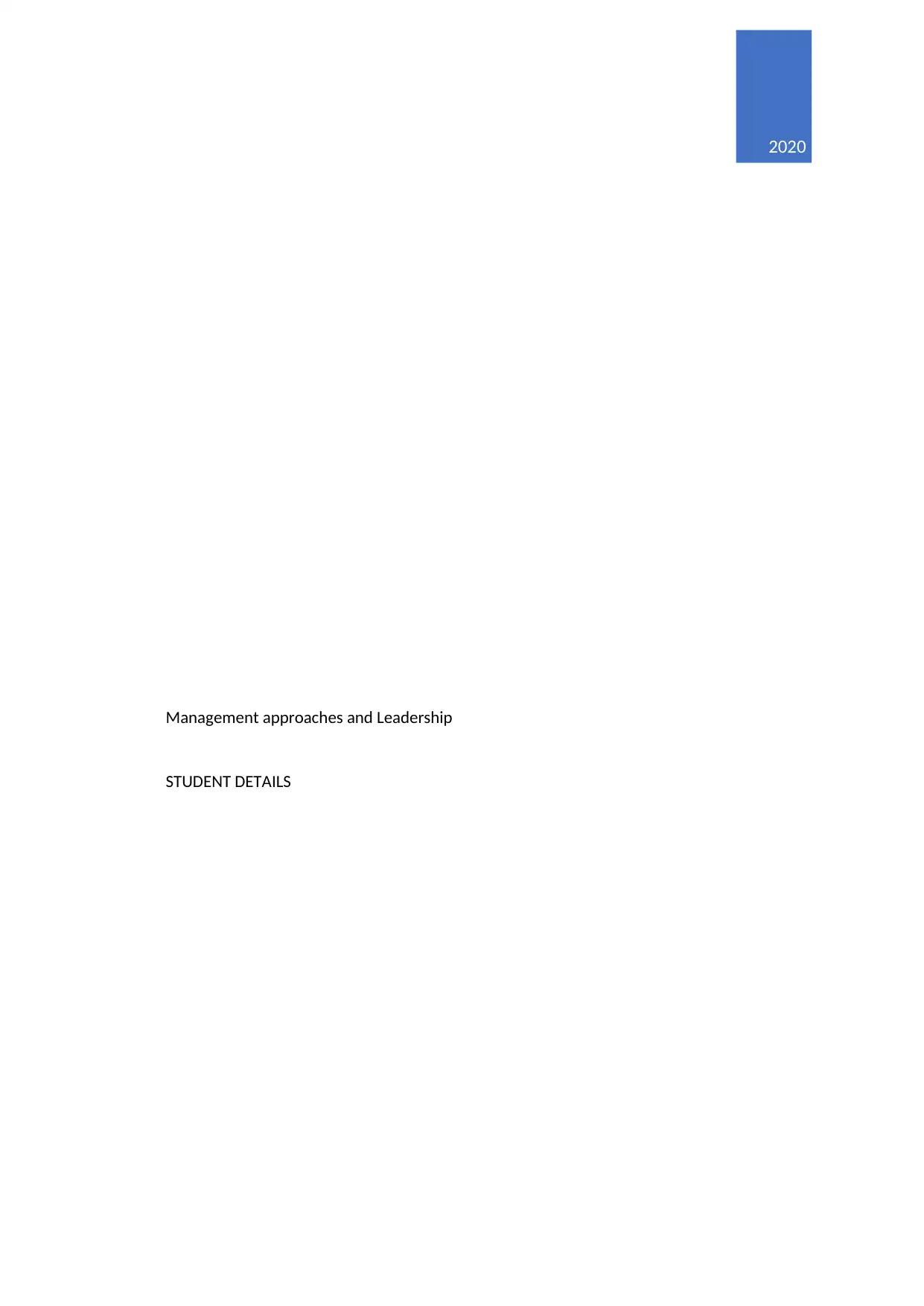
2020
Management approaches and Leadership
STUDENT DETAILS
Management approaches and Leadership
STUDENT DETAILS
Paraphrase This Document
Need a fresh take? Get an instant paraphrase of this document with our AI Paraphraser
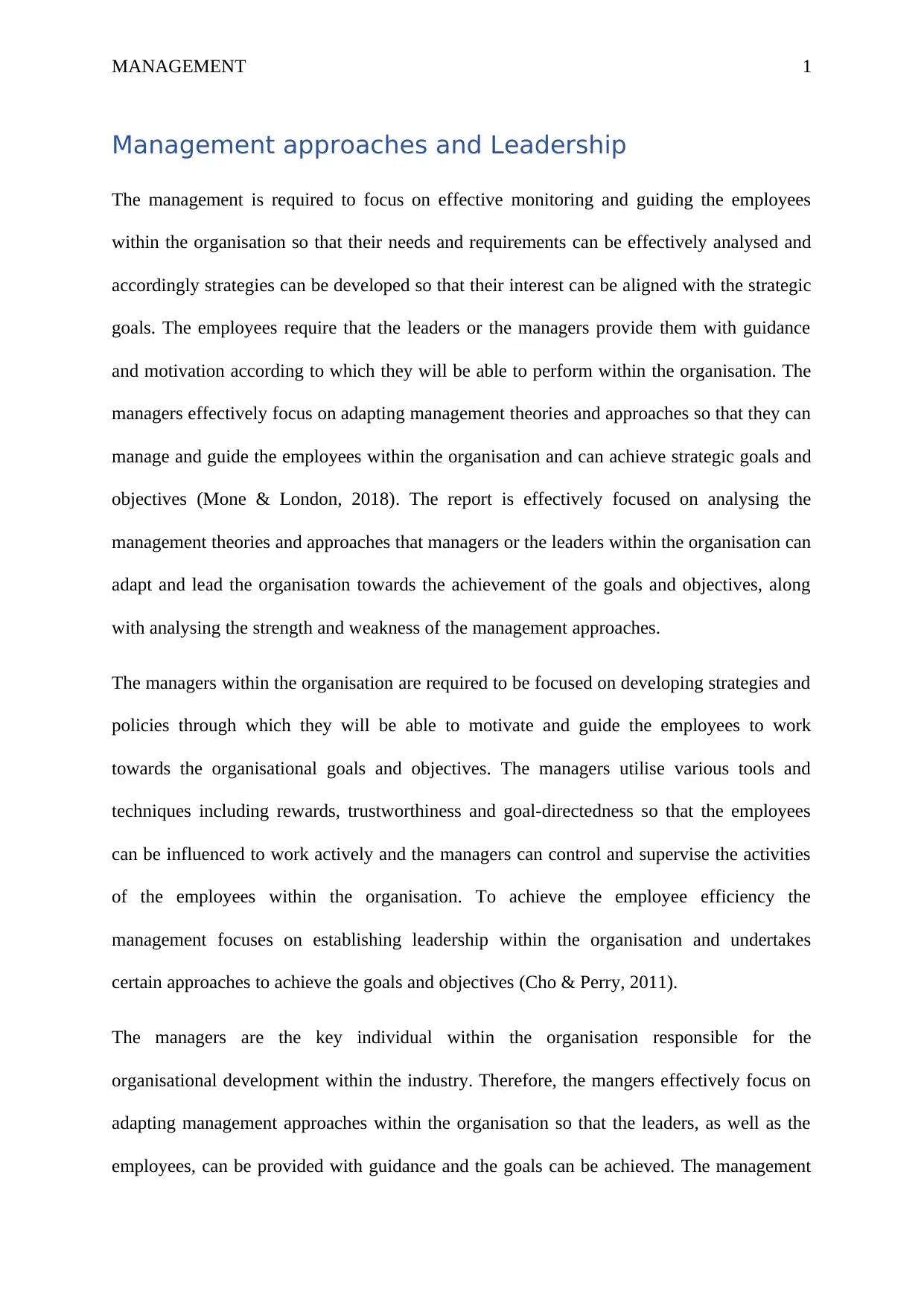
MANAGEMENT 1
Management approaches and Leadership
The management is required to focus on effective monitoring and guiding the employees
within the organisation so that their needs and requirements can be effectively analysed and
accordingly strategies can be developed so that their interest can be aligned with the strategic
goals. The employees require that the leaders or the managers provide them with guidance
and motivation according to which they will be able to perform within the organisation. The
managers effectively focus on adapting management theories and approaches so that they can
manage and guide the employees within the organisation and can achieve strategic goals and
objectives (Mone & London, 2018). The report is effectively focused on analysing the
management theories and approaches that managers or the leaders within the organisation can
adapt and lead the organisation towards the achievement of the goals and objectives, along
with analysing the strength and weakness of the management approaches.
The managers within the organisation are required to be focused on developing strategies and
policies through which they will be able to motivate and guide the employees to work
towards the organisational goals and objectives. The managers utilise various tools and
techniques including rewards, trustworthiness and goal-directedness so that the employees
can be influenced to work actively and the managers can control and supervise the activities
of the employees within the organisation. To achieve the employee efficiency the
management focuses on establishing leadership within the organisation and undertakes
certain approaches to achieve the goals and objectives (Cho & Perry, 2011).
The managers are the key individual within the organisation responsible for the
organisational development within the industry. Therefore, the mangers effectively focus on
adapting management approaches within the organisation so that the leaders, as well as the
employees, can be provided with guidance and the goals can be achieved. The management
Management approaches and Leadership
The management is required to focus on effective monitoring and guiding the employees
within the organisation so that their needs and requirements can be effectively analysed and
accordingly strategies can be developed so that their interest can be aligned with the strategic
goals. The employees require that the leaders or the managers provide them with guidance
and motivation according to which they will be able to perform within the organisation. The
managers effectively focus on adapting management theories and approaches so that they can
manage and guide the employees within the organisation and can achieve strategic goals and
objectives (Mone & London, 2018). The report is effectively focused on analysing the
management theories and approaches that managers or the leaders within the organisation can
adapt and lead the organisation towards the achievement of the goals and objectives, along
with analysing the strength and weakness of the management approaches.
The managers within the organisation are required to be focused on developing strategies and
policies through which they will be able to motivate and guide the employees to work
towards the organisational goals and objectives. The managers utilise various tools and
techniques including rewards, trustworthiness and goal-directedness so that the employees
can be influenced to work actively and the managers can control and supervise the activities
of the employees within the organisation. To achieve the employee efficiency the
management focuses on establishing leadership within the organisation and undertakes
certain approaches to achieve the goals and objectives (Cho & Perry, 2011).
The managers are the key individual within the organisation responsible for the
organisational development within the industry. Therefore, the mangers effectively focus on
adapting management approaches within the organisation so that the leaders, as well as the
employees, can be provided with guidance and the goals can be achieved. The management
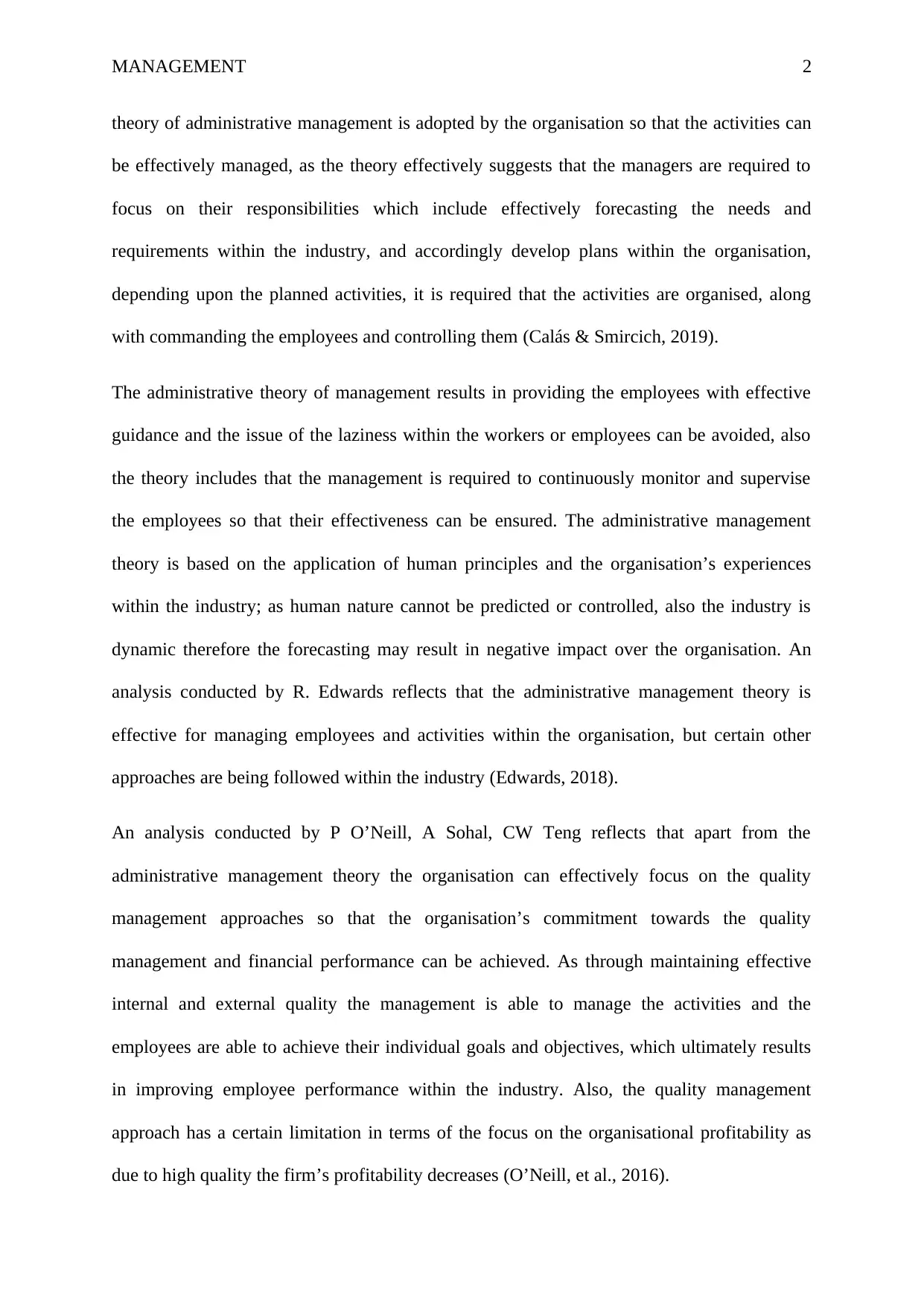
MANAGEMENT 2
theory of administrative management is adopted by the organisation so that the activities can
be effectively managed, as the theory effectively suggests that the managers are required to
focus on their responsibilities which include effectively forecasting the needs and
requirements within the industry, and accordingly develop plans within the organisation,
depending upon the planned activities, it is required that the activities are organised, along
with commanding the employees and controlling them (Calás & Smircich, 2019).
The administrative theory of management results in providing the employees with effective
guidance and the issue of the laziness within the workers or employees can be avoided, also
the theory includes that the management is required to continuously monitor and supervise
the employees so that their effectiveness can be ensured. The administrative management
theory is based on the application of human principles and the organisation’s experiences
within the industry; as human nature cannot be predicted or controlled, also the industry is
dynamic therefore the forecasting may result in negative impact over the organisation. An
analysis conducted by R. Edwards reflects that the administrative management theory is
effective for managing employees and activities within the organisation, but certain other
approaches are being followed within the industry (Edwards, 2018).
An analysis conducted by P O’Neill, A Sohal, CW Teng reflects that apart from the
administrative management theory the organisation can effectively focus on the quality
management approaches so that the organisation’s commitment towards the quality
management and financial performance can be achieved. As through maintaining effective
internal and external quality the management is able to manage the activities and the
employees are able to achieve their individual goals and objectives, which ultimately results
in improving employee performance within the industry. Also, the quality management
approach has a certain limitation in terms of the focus on the organisational profitability as
due to high quality the firm’s profitability decreases (O’Neill, et al., 2016).
theory of administrative management is adopted by the organisation so that the activities can
be effectively managed, as the theory effectively suggests that the managers are required to
focus on their responsibilities which include effectively forecasting the needs and
requirements within the industry, and accordingly develop plans within the organisation,
depending upon the planned activities, it is required that the activities are organised, along
with commanding the employees and controlling them (Calás & Smircich, 2019).
The administrative theory of management results in providing the employees with effective
guidance and the issue of the laziness within the workers or employees can be avoided, also
the theory includes that the management is required to continuously monitor and supervise
the employees so that their effectiveness can be ensured. The administrative management
theory is based on the application of human principles and the organisation’s experiences
within the industry; as human nature cannot be predicted or controlled, also the industry is
dynamic therefore the forecasting may result in negative impact over the organisation. An
analysis conducted by R. Edwards reflects that the administrative management theory is
effective for managing employees and activities within the organisation, but certain other
approaches are being followed within the industry (Edwards, 2018).
An analysis conducted by P O’Neill, A Sohal, CW Teng reflects that apart from the
administrative management theory the organisation can effectively focus on the quality
management approaches so that the organisation’s commitment towards the quality
management and financial performance can be achieved. As through maintaining effective
internal and external quality the management is able to manage the activities and the
employees are able to achieve their individual goals and objectives, which ultimately results
in improving employee performance within the industry. Also, the quality management
approach has a certain limitation in terms of the focus on the organisational profitability as
due to high quality the firm’s profitability decreases (O’Neill, et al., 2016).
⊘ This is a preview!⊘
Do you want full access?
Subscribe today to unlock all pages.

Trusted by 1+ million students worldwide
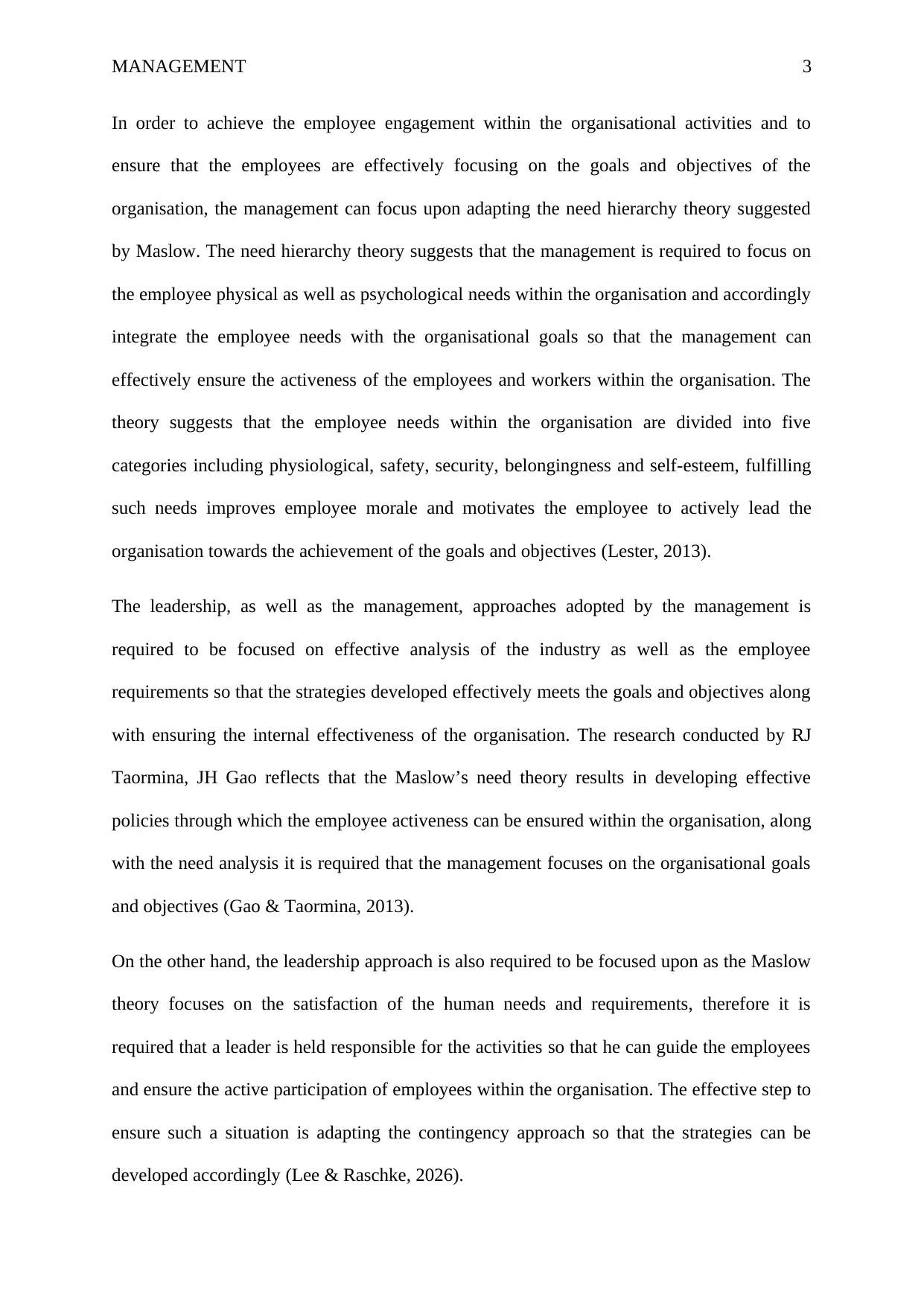
MANAGEMENT 3
In order to achieve the employee engagement within the organisational activities and to
ensure that the employees are effectively focusing on the goals and objectives of the
organisation, the management can focus upon adapting the need hierarchy theory suggested
by Maslow. The need hierarchy theory suggests that the management is required to focus on
the employee physical as well as psychological needs within the organisation and accordingly
integrate the employee needs with the organisational goals so that the management can
effectively ensure the activeness of the employees and workers within the organisation. The
theory suggests that the employee needs within the organisation are divided into five
categories including physiological, safety, security, belongingness and self-esteem, fulfilling
such needs improves employee morale and motivates the employee to actively lead the
organisation towards the achievement of the goals and objectives (Lester, 2013).
The leadership, as well as the management, approaches adopted by the management is
required to be focused on effective analysis of the industry as well as the employee
requirements so that the strategies developed effectively meets the goals and objectives along
with ensuring the internal effectiveness of the organisation. The research conducted by RJ
Taormina, JH Gao reflects that the Maslow’s need theory results in developing effective
policies through which the employee activeness can be ensured within the organisation, along
with the need analysis it is required that the management focuses on the organisational goals
and objectives (Gao & Taormina, 2013).
On the other hand, the leadership approach is also required to be focused upon as the Maslow
theory focuses on the satisfaction of the human needs and requirements, therefore it is
required that a leader is held responsible for the activities so that he can guide the employees
and ensure the active participation of employees within the organisation. The effective step to
ensure such a situation is adapting the contingency approach so that the strategies can be
developed accordingly (Lee & Raschke, 2026).
In order to achieve the employee engagement within the organisational activities and to
ensure that the employees are effectively focusing on the goals and objectives of the
organisation, the management can focus upon adapting the need hierarchy theory suggested
by Maslow. The need hierarchy theory suggests that the management is required to focus on
the employee physical as well as psychological needs within the organisation and accordingly
integrate the employee needs with the organisational goals so that the management can
effectively ensure the activeness of the employees and workers within the organisation. The
theory suggests that the employee needs within the organisation are divided into five
categories including physiological, safety, security, belongingness and self-esteem, fulfilling
such needs improves employee morale and motivates the employee to actively lead the
organisation towards the achievement of the goals and objectives (Lester, 2013).
The leadership, as well as the management, approaches adopted by the management is
required to be focused on effective analysis of the industry as well as the employee
requirements so that the strategies developed effectively meets the goals and objectives along
with ensuring the internal effectiveness of the organisation. The research conducted by RJ
Taormina, JH Gao reflects that the Maslow’s need theory results in developing effective
policies through which the employee activeness can be ensured within the organisation, along
with the need analysis it is required that the management focuses on the organisational goals
and objectives (Gao & Taormina, 2013).
On the other hand, the leadership approach is also required to be focused upon as the Maslow
theory focuses on the satisfaction of the human needs and requirements, therefore it is
required that a leader is held responsible for the activities so that he can guide the employees
and ensure the active participation of employees within the organisation. The effective step to
ensure such a situation is adapting the contingency approach so that the strategies can be
developed accordingly (Lee & Raschke, 2026).
Paraphrase This Document
Need a fresh take? Get an instant paraphrase of this document with our AI Paraphraser
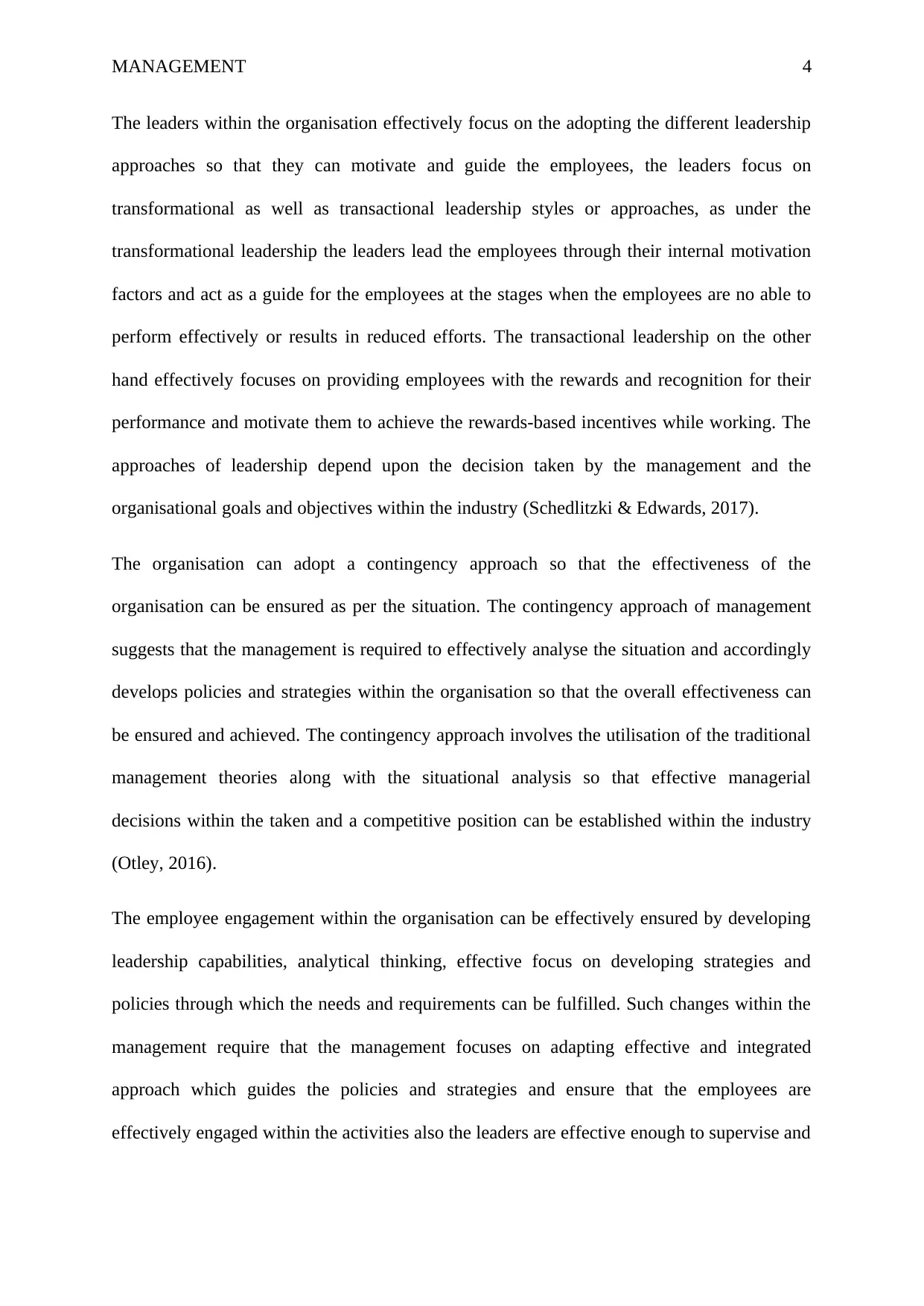
MANAGEMENT 4
The leaders within the organisation effectively focus on the adopting the different leadership
approaches so that they can motivate and guide the employees, the leaders focus on
transformational as well as transactional leadership styles or approaches, as under the
transformational leadership the leaders lead the employees through their internal motivation
factors and act as a guide for the employees at the stages when the employees are no able to
perform effectively or results in reduced efforts. The transactional leadership on the other
hand effectively focuses on providing employees with the rewards and recognition for their
performance and motivate them to achieve the rewards-based incentives while working. The
approaches of leadership depend upon the decision taken by the management and the
organisational goals and objectives within the industry (Schedlitzki & Edwards, 2017).
The organisation can adopt a contingency approach so that the effectiveness of the
organisation can be ensured as per the situation. The contingency approach of management
suggests that the management is required to effectively analyse the situation and accordingly
develops policies and strategies within the organisation so that the overall effectiveness can
be ensured and achieved. The contingency approach involves the utilisation of the traditional
management theories along with the situational analysis so that effective managerial
decisions within the taken and a competitive position can be established within the industry
(Otley, 2016).
The employee engagement within the organisation can be effectively ensured by developing
leadership capabilities, analytical thinking, effective focus on developing strategies and
policies through which the needs and requirements can be fulfilled. Such changes within the
management require that the management focuses on adapting effective and integrated
approach which guides the policies and strategies and ensure that the employees are
effectively engaged within the activities also the leaders are effective enough to supervise and
The leaders within the organisation effectively focus on the adopting the different leadership
approaches so that they can motivate and guide the employees, the leaders focus on
transformational as well as transactional leadership styles or approaches, as under the
transformational leadership the leaders lead the employees through their internal motivation
factors and act as a guide for the employees at the stages when the employees are no able to
perform effectively or results in reduced efforts. The transactional leadership on the other
hand effectively focuses on providing employees with the rewards and recognition for their
performance and motivate them to achieve the rewards-based incentives while working. The
approaches of leadership depend upon the decision taken by the management and the
organisational goals and objectives within the industry (Schedlitzki & Edwards, 2017).
The organisation can adopt a contingency approach so that the effectiveness of the
organisation can be ensured as per the situation. The contingency approach of management
suggests that the management is required to effectively analyse the situation and accordingly
develops policies and strategies within the organisation so that the overall effectiveness can
be ensured and achieved. The contingency approach involves the utilisation of the traditional
management theories along with the situational analysis so that effective managerial
decisions within the taken and a competitive position can be established within the industry
(Otley, 2016).
The employee engagement within the organisation can be effectively ensured by developing
leadership capabilities, analytical thinking, effective focus on developing strategies and
policies through which the needs and requirements can be fulfilled. Such changes within the
management require that the management focuses on adapting effective and integrated
approach which guides the policies and strategies and ensure that the employees are
effectively engaged within the activities also the leaders are effective enough to supervise and
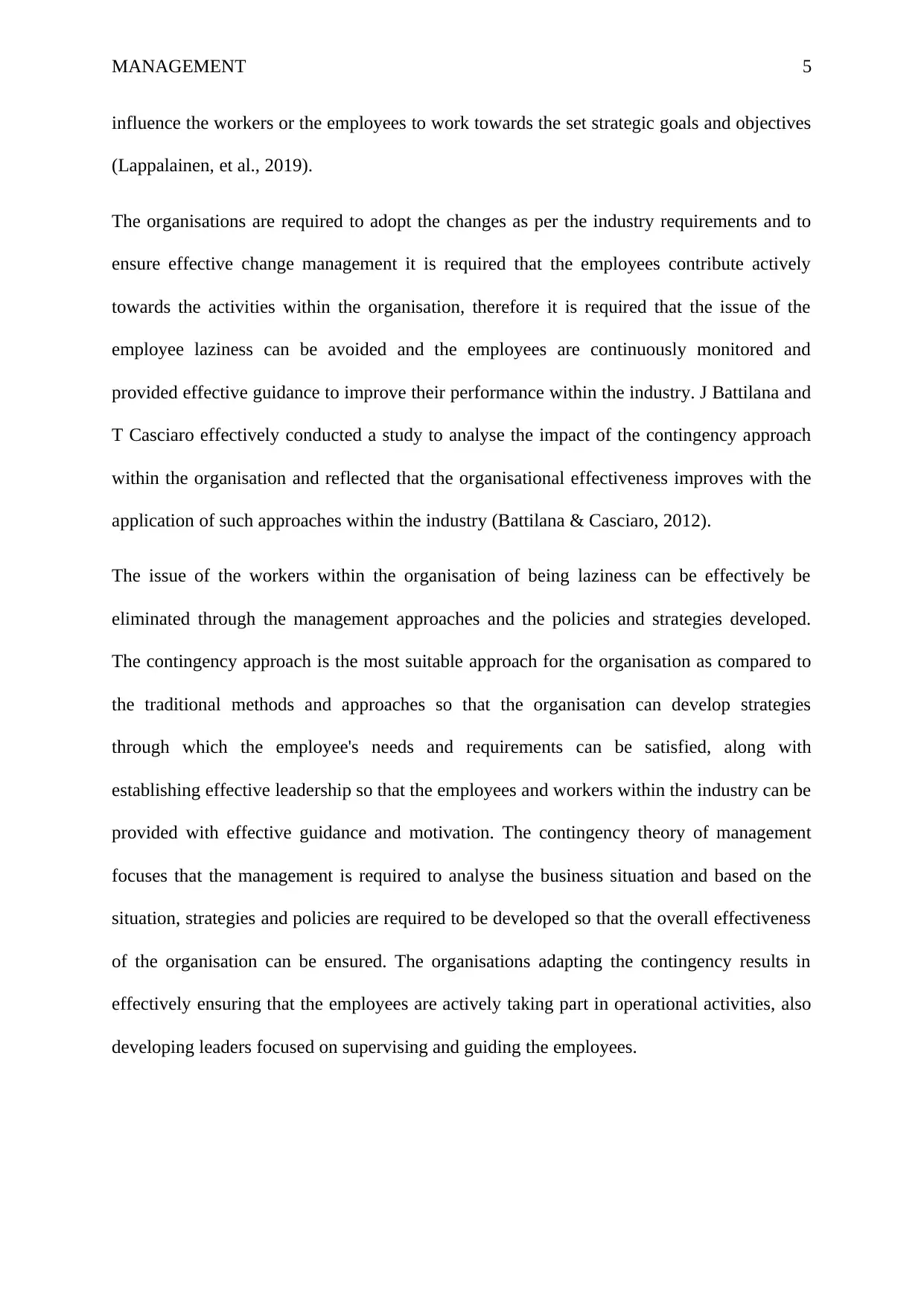
MANAGEMENT 5
influence the workers or the employees to work towards the set strategic goals and objectives
(Lappalainen, et al., 2019).
The organisations are required to adopt the changes as per the industry requirements and to
ensure effective change management it is required that the employees contribute actively
towards the activities within the organisation, therefore it is required that the issue of the
employee laziness can be avoided and the employees are continuously monitored and
provided effective guidance to improve their performance within the industry. J Battilana and
T Casciaro effectively conducted a study to analyse the impact of the contingency approach
within the organisation and reflected that the organisational effectiveness improves with the
application of such approaches within the industry (Battilana & Casciaro, 2012).
The issue of the workers within the organisation of being laziness can be effectively be
eliminated through the management approaches and the policies and strategies developed.
The contingency approach is the most suitable approach for the organisation as compared to
the traditional methods and approaches so that the organisation can develop strategies
through which the employee's needs and requirements can be satisfied, along with
establishing effective leadership so that the employees and workers within the industry can be
provided with effective guidance and motivation. The contingency theory of management
focuses that the management is required to analyse the business situation and based on the
situation, strategies and policies are required to be developed so that the overall effectiveness
of the organisation can be ensured. The organisations adapting the contingency results in
effectively ensuring that the employees are actively taking part in operational activities, also
developing leaders focused on supervising and guiding the employees.
influence the workers or the employees to work towards the set strategic goals and objectives
(Lappalainen, et al., 2019).
The organisations are required to adopt the changes as per the industry requirements and to
ensure effective change management it is required that the employees contribute actively
towards the activities within the organisation, therefore it is required that the issue of the
employee laziness can be avoided and the employees are continuously monitored and
provided effective guidance to improve their performance within the industry. J Battilana and
T Casciaro effectively conducted a study to analyse the impact of the contingency approach
within the organisation and reflected that the organisational effectiveness improves with the
application of such approaches within the industry (Battilana & Casciaro, 2012).
The issue of the workers within the organisation of being laziness can be effectively be
eliminated through the management approaches and the policies and strategies developed.
The contingency approach is the most suitable approach for the organisation as compared to
the traditional methods and approaches so that the organisation can develop strategies
through which the employee's needs and requirements can be satisfied, along with
establishing effective leadership so that the employees and workers within the industry can be
provided with effective guidance and motivation. The contingency theory of management
focuses that the management is required to analyse the business situation and based on the
situation, strategies and policies are required to be developed so that the overall effectiveness
of the organisation can be ensured. The organisations adapting the contingency results in
effectively ensuring that the employees are actively taking part in operational activities, also
developing leaders focused on supervising and guiding the employees.
⊘ This is a preview!⊘
Do you want full access?
Subscribe today to unlock all pages.

Trusted by 1+ million students worldwide
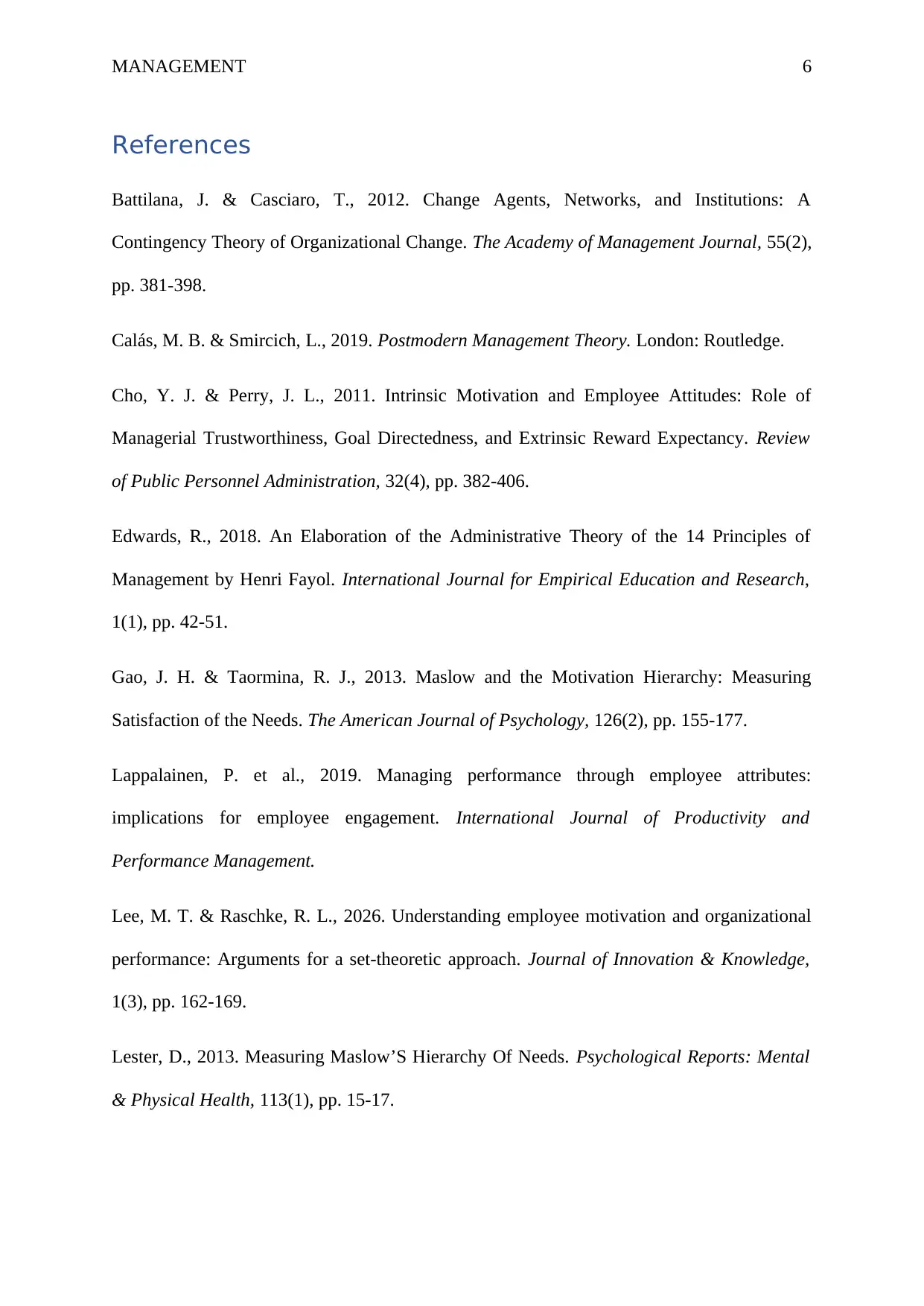
MANAGEMENT 6
References
Battilana, J. & Casciaro, T., 2012. Change Agents, Networks, and Institutions: A
Contingency Theory of Organizational Change. The Academy of Management Journal, 55(2),
pp. 381-398.
Calás, M. B. & Smircich, L., 2019. Postmodern Management Theory. London: Routledge.
Cho, Y. J. & Perry, J. L., 2011. Intrinsic Motivation and Employee Attitudes: Role of
Managerial Trustworthiness, Goal Directedness, and Extrinsic Reward Expectancy. Review
of Public Personnel Administration, 32(4), pp. 382-406.
Edwards, R., 2018. An Elaboration of the Administrative Theory of the 14 Principles of
Management by Henri Fayol. International Journal for Empirical Education and Research,
1(1), pp. 42-51.
Gao, J. H. & Taormina, R. J., 2013. Maslow and the Motivation Hierarchy: Measuring
Satisfaction of the Needs. The American Journal of Psychology, 126(2), pp. 155-177.
Lappalainen, P. et al., 2019. Managing performance through employee attributes:
implications for employee engagement. International Journal of Productivity and
Performance Management.
Lee, M. T. & Raschke, R. L., 2026. Understanding employee motivation and organizational
performance: Arguments for a set-theoretic approach. Journal of Innovation & Knowledge,
1(3), pp. 162-169.
Lester, D., 2013. Measuring Maslow’S Hierarchy Of Needs. Psychological Reports: Mental
& Physical Health, 113(1), pp. 15-17.
References
Battilana, J. & Casciaro, T., 2012. Change Agents, Networks, and Institutions: A
Contingency Theory of Organizational Change. The Academy of Management Journal, 55(2),
pp. 381-398.
Calás, M. B. & Smircich, L., 2019. Postmodern Management Theory. London: Routledge.
Cho, Y. J. & Perry, J. L., 2011. Intrinsic Motivation and Employee Attitudes: Role of
Managerial Trustworthiness, Goal Directedness, and Extrinsic Reward Expectancy. Review
of Public Personnel Administration, 32(4), pp. 382-406.
Edwards, R., 2018. An Elaboration of the Administrative Theory of the 14 Principles of
Management by Henri Fayol. International Journal for Empirical Education and Research,
1(1), pp. 42-51.
Gao, J. H. & Taormina, R. J., 2013. Maslow and the Motivation Hierarchy: Measuring
Satisfaction of the Needs. The American Journal of Psychology, 126(2), pp. 155-177.
Lappalainen, P. et al., 2019. Managing performance through employee attributes:
implications for employee engagement. International Journal of Productivity and
Performance Management.
Lee, M. T. & Raschke, R. L., 2026. Understanding employee motivation and organizational
performance: Arguments for a set-theoretic approach. Journal of Innovation & Knowledge,
1(3), pp. 162-169.
Lester, D., 2013. Measuring Maslow’S Hierarchy Of Needs. Psychological Reports: Mental
& Physical Health, 113(1), pp. 15-17.
Paraphrase This Document
Need a fresh take? Get an instant paraphrase of this document with our AI Paraphraser
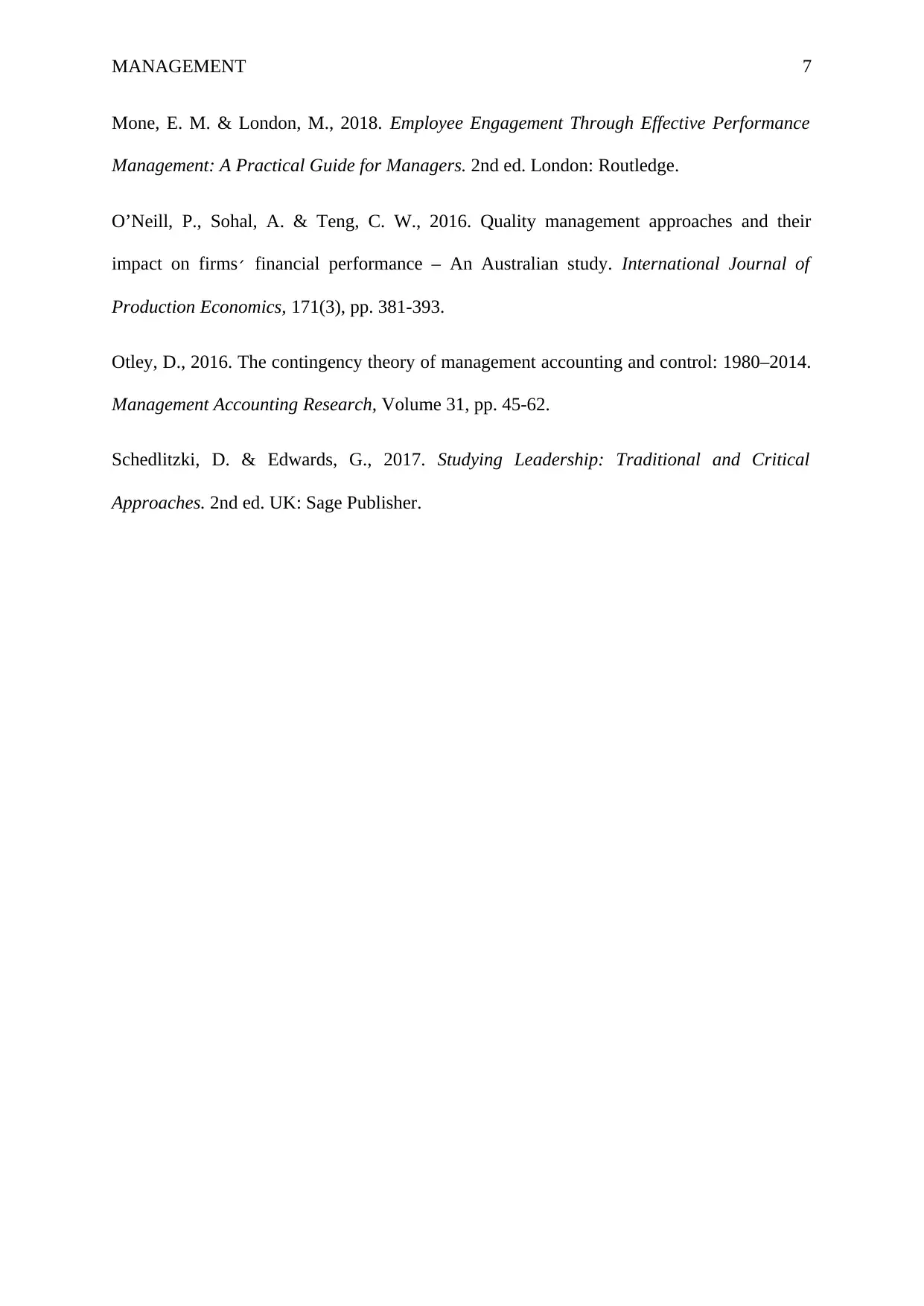
MANAGEMENT 7
Mone, E. M. & London, M., 2018. Employee Engagement Through Effective Performance
Management: A Practical Guide for Managers. 2nd ed. London: Routledge.
O’Neill, P., Sohal, A. & Teng, C. W., 2016. Quality management approaches and their
impact on firms׳ financial performance – An Australian study. International Journal of
Production Economics, 171(3), pp. 381-393.
Otley, D., 2016. The contingency theory of management accounting and control: 1980–2014.
Management Accounting Research, Volume 31, pp. 45-62.
Schedlitzki, D. & Edwards, G., 2017. Studying Leadership: Traditional and Critical
Approaches. 2nd ed. UK: Sage Publisher.
Mone, E. M. & London, M., 2018. Employee Engagement Through Effective Performance
Management: A Practical Guide for Managers. 2nd ed. London: Routledge.
O’Neill, P., Sohal, A. & Teng, C. W., 2016. Quality management approaches and their
impact on firms׳ financial performance – An Australian study. International Journal of
Production Economics, 171(3), pp. 381-393.
Otley, D., 2016. The contingency theory of management accounting and control: 1980–2014.
Management Accounting Research, Volume 31, pp. 45-62.
Schedlitzki, D. & Edwards, G., 2017. Studying Leadership: Traditional and Critical
Approaches. 2nd ed. UK: Sage Publisher.
1 out of 8
Related Documents
Your All-in-One AI-Powered Toolkit for Academic Success.
+13062052269
info@desklib.com
Available 24*7 on WhatsApp / Email
![[object Object]](/_next/static/media/star-bottom.7253800d.svg)
Unlock your academic potential
Copyright © 2020–2026 A2Z Services. All Rights Reserved. Developed and managed by ZUCOL.





